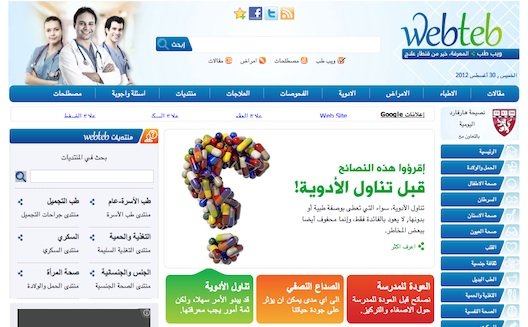Palestinian Entrepreneur Leaves Medical Practice to Bring Health Advice to the Masses


Update September 26, 2012: WebTeb announced the launch of its Symptom Checker, TebChecker. This tool includes extensive information created by and licensed from Harvard Health Publications, a division of Harvard Medical School, and is a step-by-step interactive guide to help users understand what their medical symptoms could mean and provide them with the possible causes, diagnoses, and treatments of common conditions.
You can try out the TebChecker here.
For Palestinian entrepreneur Mahmoud Kaiyal, building a medical advice portal is a labor of love.
After practicing medicine for 8 years as a family doctor, Kaiyal left nine months ago, to launch WebTeb with the goal of bringing healthcare to a broader population online.
"I love practicing medicine," he says wistfully over a Skype call, "but managing WebTeb is a fulltime job, and I had to choose. Doing both means you're not doing either of them well. I love doing what I'm doing now."
The site, whose name references the Arabic word for medicine, "teb," launched in January in both Ramallah and Amman to offer a series of features popularized on U.S. sites like WebMD, all in Arabic. This includes a Q&A section, physician directory, as well as original content that the site licenses, translates, and has specialists review.
Since launch, it's risen quickly, now seeing over a million visits monthly, primary from Saudi Arabia, Egypt, Morocco, Algeria and Iraq, with a 60% increase during Ramadan, when the site featured special content on fasting and healthy iftar recipes.
It's clear that the MENA region is hungry for discreet medical advice in Arabic, as many, especially women, don't have direct access to healthcare or the information that they crave. Soon the site will launch an Arabic version of a symptom checker developed at Harvard, to bring its audience more diagnostic ability (with the requisite disclaimer that it's not meant to replace diagnosis by a doctor).
There's a touch of rivalry at play here - medical portal Altibbi, founded by Palestinian-Jordanian entrepreneur Jalil Allabadi, launched a symptom checker in May that its team built from the ground up to suit the region.
Yet Kaiyal, who will launch WebTeb's symptom checker in a few weeks, decided to localize an existing technology that had been vetted. "Over 600 doctors were involved in creating this symptom checker at Harvard," he says. "We knew it was credible."
Any sense of rivalry with Altibbi and other portals seems not to faze Kaiyal, as it shouldn't - there seems to be plenty of room for both in the space. One day it will be interesting to see if one gets acquired first; for now, WebTeb is building. It plans to launch the Arab World's first Arabic drug interaction index, which will let users know which drug they should not combine, and plans to launch several big projects soon.
It's not Kaiyal's first web startup. For three years, he ran MyQuicker.com, a password management website. But with WebTeb, he's merged his passion with his hobby, hoping to democratize the process of receiving healthcare. He derives satisfaction from knowing that "part of the money that patients pay for healthcare is supporting WebTeb, as healthcare companies pay for advertising; we are turning around and using it to make health content available for free."
He may miss being a doctor, but it's clear he's happier serving a bigger audience, responding to patient questions on forums when he can, but mostly taking their feedback to improve the site. "As a doctor, I find it very satisfying to get site feedback from my patients, I mean users," he writes with a wink.


